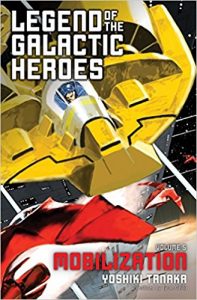 translated by Tyran Grillo
translated by Tyran Grillo
November 21, 2017
272 pages
I’ve now read the first five books in the Legend of the Galactic Heroes series, and I’m impressed by how well Tanaka controls the plot of this intergalactic war and its main participants across so many pages without the story unraveling (kind of like the Galactic Empire trying to figure out how to conquer the known universe without letting its supply lines falter over such great distances).
In this fifth volume, Reinhard von Lohengramm puts into action his plan to bypass Iserlohn Fortress and use the neutral planet of Phezzan as an alternate route toward taking over the Free Planets Alliance. Once again, Yang Wen-li is forced to make some intensely difficult decisions, including whether or not to abandon the hard-won fortress and protect the inhabited FPA planets (including Heinessen, the capital) against GE attack. Ultimately, Yang decides to abandon the fortress, but Tanaka teases us with the suggestion that Yang has left some kind of booby-trap for the GE to discover, something much more important than a few measly explosives. (By the way, this review doesn’t contain spoilers, so no worries about reading on).
As in the previous four books, Tanaka brilliantly describes Lohengramm and Yang’s battle strategies and also graphically details the carnage produced by the skirmishes and battles in what is soon called the “Vermillion War.” All along, I’ve sensed that Tanaka is “closest” to Yang, as in, Yang represents, more than any of the other characters, Tanaka’s ideas about war and politics. After all, Tanaka is the author of this series, and Yang is himself an historian-turned-military-commander, who wishes he could retire and write about history. Further, Tanaka’s narrator makes repeated references, in this and the previous volumes, to “future historians” and their theories and conclusions about the grand clashes between two powerful forces. History, then, plays a major role in this series, suggesting that the narrator/author is writing from a point even farther into the future than the events we’re reading about- that is, several hundred years beyond the 21st century.
Tanaka further develops another major strain in this series in Volume 5: the tension between a corrupted democracy and an “enlightened” autocracy. While the FPA began as a democratic system, it has disintegrated over time into a corrupted version of itself, in which the leaders care only for their own gain and maintaining political power. The GE, on the other hand, is ruled by a single person (Lohengramm), but that person is not so much concerned with wealth and resources as with glory and galactic domination. Lohengramm, like Yang, is brave, brilliant, and keenly aware of his own frailties. Life under his rule, Tanaka suggests, might not be that terrible, except for the fact that the people have no say in the direction the empire takes and must follow their leader’s orders no matter what they think. This constant tension between two political philosophies adds dimension and complexity to an otherwise exciting and fast-paced space opera.
Happily for us readers, Volumes 6 and 7 are coming out this year, so we can find out about the immediate aftermath of the Vermillion War and follow up on some side plots that may become more important in the near future.
*Read my reviews of Volumes 1, 2, 3, and 4, as well as Charles Tan’s series overview.
